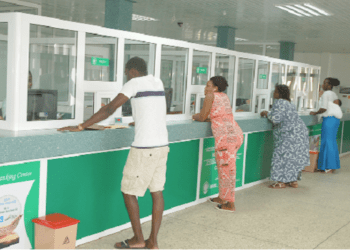Ghana’s credit market witnessed a historic surge in activity in 2024, with credit enquiries more than doubling from the previous year.
According to the Bank of Ghana’s (BoG) latest Credit Reporting Activity Report, enquiries soared to 29.5 million, marking a staggering 114.6% increase compared to 13.7 million in 2023.
On a monthly basis, credit enquiries averaged 2.46 million, up 16.24% year-on-year, from a monthly average of 2.11 million in 2023. This unprecedented growth underscores the increasing integration of credit reporting into Ghana’s financial ecosystem, especially as the digital lending market gains momentum.
The report highlights the expanding role of fintech in shaping Ghana’s credit landscape. Individuals accounted for 55% of credit searches, while 44% targeted digital loan customers, showcasing the dominance of fintech-driven credit solutions in the country.
The popularity of instant mobile-based loans, app-driven lending platforms, and micro-lending services has brought millions of Ghanaians into the formal credit system. Financial analysts say this trend is enhancing access to finance for individuals and small businesses, although it also underscores the need for robust data quality and borrower assessment standards.
Data Submissions Surge by 190%
Beyond the record number of credit enquiries, data submissions to credit bureaus also soared. In 2024, an average of 61.14 million loan records were submitted each month, representing a 190.33% jump from the previous year.
Notably, 99.7% of these records related to individual borrowers, further reflecting the dominance of personal and digital lending in Ghana’s loan market. These submissions included data on new loans, updates on existing loan statuses, and information from digital lending platforms.
The year 2024 also brought significant regulatory and operational advancements to Ghana’s credit reporting framework. The BoG extended the deadline for meeting the new GHS 6 million minimum capital requirement for credit bureaus to June 2025, giving operators more time to meet the standard.
In addition, a new player, MyCredit Score Ltd, entered the market, increasing the total number of licensed credit bureaus to three. These bureaus also received approval to begin offering credit scoring services—a move expected to boost transparency and help lenders make better-informed decisions.
Cross-Border Credit Reporting Launched
One of the most notable innovations in 2024 was the launch of cross-border credit reporting. This was spearheaded by XDS Data Ghana Ltd in partnership with Nova Credit Inc. of the United States. The service is designed to enable lenders in Ghana to assess the creditworthiness of individuals and businesses with international credit histories, opening up new possibilities for trade, investment, and migration-linked financing.
The BoG’s review also noted substantial improvements in data quality, regulatory compliance, and stakeholder engagement across the credit reporting sector. The report cited a decline in dud cheque incidents, an increase in the use of credit reports, and rising public awareness as evidence of a maturing and more resilient credit ecosystem.
According to the central bank, these improvements are critical to building trust in Ghana’s credit system and ensuring that it supports the broader goal of sustainable economic growth.
BoG’s Commitment to a Transparent and Inclusive Market
The Bank of Ghana reaffirmed its commitment to further strengthening the nation’s credit reporting infrastructure. Its priorities for 2025 include stricter enforcement of regulations, expanded public education campaigns, and closer collaboration with policymakers.
By ensuring that credit information is accurate, accessible, and comprehensive, the BoG believes the credit market can become more transparent, inclusive, and capable of meeting the needs of both lenders and borrowers.
The sharp rise in credit enquiries and data submissions reflects a broader shift towards a data-driven credit culture in Ghana. With more individuals and businesses having their credit histories documented, financial institutions can make more informed lending decisions, reduce default risks, and extend credit to previously underserved populations.
READ ALSO: Standard Chartered Seals $150M Amazon Carbon Credit Deal























